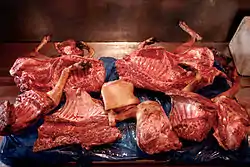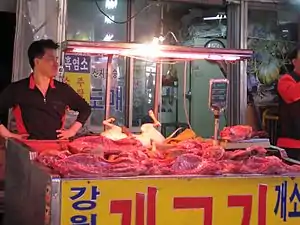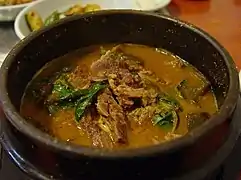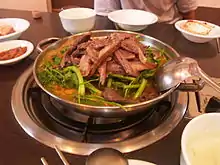Dog meat consumption in South Korea
The consumption of dog meat in South Korea, where it is known as "Gaegogi" (Korean: 개고기, literally "dog meat"), has a long history originating during the Three Kingdoms of Korea period of the first century AD.[1] However, in recent years, it has become controversial both in South Korea and around the world, due to animal rights and sanitary concerns.
| Dog meat consumption in South Korea | |
 Dog meat on sale in a South Korean market | |
| Korean name | |
|---|---|
| Hangul | |
| Revised Romanization | Gaegogi |
| McCune–Reischauer | Kaegogi |
| North Korean name | |
| Hangul | |
| Revised Romanization | Dan(-)gogi |
| McCune–Reischauer | Tan'gogi |
According to some sources, consumption of dog meat is becoming less common in modern-day South Korea, especially among younger people, and the practice is declining. Estimates of the number of animals consumed vary widely. According to the Korean Animal Rights Advocates (KARA), approximately 780,000 to 1 million dogs are consumed per year in South Korea.[2] Sales at Moran Market have been declining in the past few years and were down to about 20,000 dogs per year in 2017.[3] South Korea's Statistical Information Service 2015 agriculture census reported a total of 24,671 facilities holding 521,201 dogs, though this figure includes both animals raised for the pet industry and those raised for meat consumption.[4] In 2018, the Taepyeong-dong complex, which served as a slaughterhouse for hundreds of thousands of dogs on a yearly basis, was closed by the South Korean government.[5][6] This move came five years after a vote by the city council of Seongnam, the city where the slaughterhouse was located.[5][6]
In June 2018, a South Korean municipal court ruled that killing dogs for their meat was illegal, though this does not make it illegal to consume dog meat.
History
As a general practice, dog meat has never been a mainstream part of the Korean diet throughout the nation's history.[7][8] The consumption of dog meat can be traced back to antiquity in isolated cases, and dog bones were excavated in a neolithic settlement in Changnyeong, South Gyeongsang Province. A wall painting in the Goguryeo tombs complex in South Hwanghae Province, a UNESCO World Heritage site dating from the 4th century AD, depicts a slaughtered dog in a storehouse (Ahn, 2000).[9]
Starting in the Silla Dynasty (57 BC – 935 AD) and then during the Goryeo Dynasty (AD 918–1392), Buddhism was the state religion and eating beef was considered immoral and was at first discouraged and then banned (cows were regarded as human work companions).[10] In general, animal life was regarded as sacred and eating meat was minimized; however, eating seafood remained common.[11][12] During the latter part of the Goryeo Dynasty, the practice of eating dog meat was introduced by the nomadic Khitans, who as war refugees spilled into Goryeo during the Mongol invasions. The invading Mongols lifted the beef ban and legalized the consumption of meat during their rule. During the Joseon Dynasty (AD 1392–1910), the minority Khitans eventually assimilated into the social structure as the "Baekjeong," the first butcher class, occupying the lowest class of society.[13] The Joseon government assigned the Baekjeong the task of addressing the feral dog problem, and thus dog meat became a food item for the poor (and lower classes). During the Joseon Dynasty, certain government officials argued that dogs were human companions and wanted to ban the consumption of dog meat.[14]
In approximately 1816, Jeong Hak-yu, the second son of Jeong Yak-yong, a prominent politician and scholar of Joseon dynasty at the time, wrote a poem called Nongga Wollyeongga (농가월령가). This poem, which is an important source of Korean folk history, describes what ordinary Korean farming families did during each month of a year. In the description of the month of August, the poem tells of a married woman visiting her birth parents with boiled dog meat, rice cakes, and rice wine, thus showing the popularity of dog meat at the time (Ahn, 2000; Seo, 2002). Dongguksesigi (동국세시기), a book written by Korean scholar Hong Seok-mo in 1849, contains a recipe for Bosintang including a boiled dog, green onions, and red chili pepper powder.[9]
There is a traditional anniversary in South Korea called Sambok (三伏), during which Koreans in the modern day eat Baeksuk, a chicken soup with rice and herbs. However, some South Koreans choose to consume Bosintang instead, a soup containing dog meat.[15]
Current situation

In 2014, 329 restaurants served dog meat in Seoul, and the numbers are continuing to decline each year.[16] Some restaurants are reporting declines in consumption of 20–30% per year.[17]
Dog meat is often consumed during the summer months and is either roasted or prepared in soups or stews.[18] The most popular of these soups is Gaejang-guk, a spicy stew meant to balance the body's heat during the summer months. This is thought to ensure good health by balancing one's "ki", or the vital energy of the body. A 19th-century version of Gaejang-guk (개장국) explains the preparation of the dish by boiling dog meat with green onions and chili powder. Variations of the dish contain chicken and bamboo shoots.[19]
On December 13, 2016, the termination of dog slaughter and the closure of slaughtering facilities at Moran Market was announced by the local government and vendors' association.[20] The decision was reached in an effort to mitigate the negative views of the market by remodeling it as part of a city project. All of the dog slaughtering facilities in the market were planned to be removed by May 2017 and the vendors were to be aided financially by the government in the process.[20]
Inspired by this decision, protesters gathered at Gupo Market in Busan in February 2017, calling for the closure of the dog meat vendors there.[21] The Gupo Market is of similar size to the Moran Market and has been around since the Joseon Dynasty. In recent decades, the number of dog meat vendors in the market has decreased to only 22 due to the efforts of the government trying to improve the image of the city for tourists.[21] In July 2019 animal groups in South Korea including KARA, KAWA, Busan KAPCA and Humane Society International/Korea assisted the Busan mayor in closing down Gupo dog meat market. The authorities plan to replace it with a public park. https://www.hsi.org/news-media/south-korea-shuts-down-gupo-dog-meat-market/
On November 21, 2018, South Korea closed the country's main dog slaughterhouse, known as Taepyeong-dong.[6] The slaughterhouse was located in Seongnam.[6] The Seongnam city council, which voted in 2013 to close the slaughterhouse,[6] will turn the area into a community park.[5]
Dogs used for meat
The primary dog breed raised for meat is a non-specific landrace commonly named as Nureongi (누렁이), or Hwanggu (황구).[22][23] Nureongi are not the only type of dog currently slaughtered for their meat in South Korea. In 2015, The Korea Observer reported that many different pet breeds of dog are bred to be eaten, including, for example, labradors, retrievers, and cocker spaniels, and that the dogs slaughtered for their meat often include former pets.[24] Humane Society International/Korea has been working cooperatively with dog farmers since 2015 to help them close their farms, and rehome the dogs. As of August 2020 HSI has closed down 16 dog meat farms and rescued more than 2,000 dogs. The charity documents every farm closure to show the conditions, and it is clear that all breeds of dog are found on these facilities including golden retrievers, beagles, poodles and huskies alongside tosas and jindos.[25]
According to the Korean Animal Rights Advocates (KARA), there are approximately 3,000 dog meat farms operating across the country,[3] many of which receive dogs as overflow from puppy mills for the pet industry.[26] With declining demand for dog meat in Korea, a more serious problem now is excess dogs stemming from the puppy mill industry.[26]
The majority of dogs are slaughtered by electrocution, though some are hung or beaten over the head before exsanguination, even though such practices are illegal under the 2007 Animal Protection Act.[24]
In 2015, it was reported that when retrievers are sold as meat dogs, they cost over 200,000 Korean Won (£140 British pounds or $180 US dollars).[24]
Legal status
Between 1975 and 1978, dogs had the full legal status of livestock animals in South Korea, but the legality of the dog meat trade is now highly disputed. South Korea adopted its first Animal Protection Law in May, 1991.[27]
Currently, Article 7 of the Animal Protection Act does not explicitly prohibit the slaughter of dogs for food; however, it "prohibits killing animals in a brutal way". In addition, it "forbids killing the dogs in open areas such as on the street or in front of other animals of the same species".[24]
The controversy over dog meat has led to lobbying for/against regulation by charities such as NoToDogMeat, as well as differing interpretations of existing laws.
Dog meat is subject to the Food Sanitation Act/Food Hygiene Act of 1962, which simply defines food as "all foodstuff, except taken as medicine". However, unlike beef, pork, or poultry, dog meat is excluded from the list of livestock under the Livestock Processing Act of 1962,[note 1] which is "the principal statute governing hygienic slaughtering of livestock and processing of meat." Hence, dog meat farming is under-regulated compared to that of other stock animals.[28]
As a result, there are no regulations requiring the humane slaughter of dogs for meat. The controversy over dog meat consumption often centers on the slaughtering methods employed, which include electrocution, strangulation by hanging, and physically beating the dog to death. Some dogs are still alive when they are blow-torched or thrown into boiling water to remove their fur.[29] Some people believe that dog meat should be expressly legalized so that only authorized preparers can deal with the meat in more humane and sanitary ways, while others think that the practice should be banned by law.
In 2008, the Seoul Metropolitan Government proposed a recommendation to the national government to add dogs to the list of livestock whose slaughter is regulated by law.[30] However, activist groups attacked the proposal as legitimizing or legalizing the trade in dog meat.[31][32] The city dropped the proposal, but an official from the national government was quoted as saying “It’s the sole idea of the city. We have not been consulted at all ... I don’t think we are planning to even consider this option.”[33]
In June 2018, the municipal court of the city of Bucheon ruled that killing dogs for their meat was illegal. The landmark decision came after much criticism from animal advocates in the country. The court case was brought forward by animal rights group Coexistence of Animal Rights on Earth (Care) against a dog farm, which they said was killing animals without a real reason.[34]
Types of dishes


- Bosintang (보신탕; 補身湯); Gaejangguk (개장국) Stew containing boiled dog meat and vegetables.[35]
- Gaegogi Jeongol (개고기 전골) – An elaborate dog stew made in a large Jeongol pan.
- Gae Suyuk (개 수육; 개水肉)- Boiled dog meat[35]
- Gaegogi Muchim (개고기 무침) – Steamed dog meat, Korean leeks (부추), and vegetables mixed with spices[35]
- Gaesoju (개소주; 개燒酒) – Mixed drink containing dog meat and other Chinese medicine ingredients such as ginger, chestnut, and jujube to invigorate one's health.[36][37]
International scrutiny
During the 1988 Summer Olympics in Seoul, the South Korean government urged its citizens not to consume dog meat in order to avoid bad publicity during the games, along with a request to butcher shops not to hang dog carcasses in the windows.[38] It also closed all restaurants serving Gaejang-guk to better improve the country's image to Western visitors. A 1998 Salon article reported that despite officially being banned by the government for a decade, nearly 20,000 restaurants at the time were still serving dog meat.[39] South Korea's successful bid to join the Organisation for Economic Co-operation and Development (OECD) in 1996 prompted a new wave of criticism against its dog meat culture. Activists argue that as whale meat consumption declined in Japan after the 1964 Summer Olympics, South Koreans should reduce their consumption of dog meat.[40]
The controversy surfaced again in 2001 during the 2002 FIFA World Cup.[41][42] The organizers of the games, under pressure from animal rights groups such as PETA, demanded that the Korean government re-address the issue. Brigitte Bardot, a prominent head of a French animal rights organization which is named after her, launched a campaign during the 2002 FIFA World Cup to have dog meat outlawed in Korea. She encouraged people to boycott the games if the government did not outlaw the sale of dog meat in restaurants in Seoul.
In October 2018, a leading Egyptian MP (Margaret Azer) suggested that Egypt export stray dogs for meat consumption to countries like South Korea as a solution to the problem of overpopulation of stray dogs in the country.
Azer's statements sparked a wave of criticism among animal rights advocates and rescuers in Egypt, although no such plans were ever proven to be in place.
Humane Society International [43] is one of the leading international charities working in South Korea to end the dog meat trade, working in partnership with other local Korean groups such as KARA and KAWA. Their dog meat farm closures and associated dog rescues gather much global media interest, and receive support from notable international celebrities such as Ricky Gervais, and Simon Cowell who donated £25,000 to help the charity close a dog farm.[44]
Controversy
In Korea, some people eat Bosintang (literally "invigorating soup"), believing it to have medicinal properties, particularly as relates to virility. In China, dog meat is also believed to encourage one's energy or virility. There is no scientific evidence to support any purported health benefits from consuming dog meat.
Many Korean Buddhists consider eating any kind of meat an offense.[45]
In recent years, some South Koreans have changed their attitudes towards eating dog meat as a matter of "personal choice" to considering it an "unnecessary cruelty." Animal rights activists in South Korea protest against the custom of eating dog meat.[46] Since 1988, international animal welfare activists – most notably, French actress Brigitte Bardot – have campaigned against dog meat consumption in South Korea. However, Korean nationalists on the internet have argued that a double standard exists, accusing non-Korean animal welfare activists of forcing "Westernization" on South Korea.[40][47] A 2007 survey by the South Korean agriculture ministry showed that 59% of South Koreans aged under 30 would not eat dog. Some 62% of the same age group said they regard dogs as pets, not food.[48] Many young Koreans think those who eat dog are anachronists.[49]
The charity NoToDogMeat (World Protection For Dogs And Cats In The Meat Trade) opposes the consumption and trade of dog meat in South Korea, viewing it as an unregulated industry, with conditions it views as unsanitary and cruel.[50] Korea Animal Rights Advocates (KARA) estimates that approximately 1 million dogs are consumed per year in South Korea.[3] Several organizations, such as In Defense of Animals, KARA, Guardians of Rescue, and koreandogs.org, are petitioning the South Korean government to ban dog meat consumption. Since 2002, as the outcry has grown, the number of dogs raised as livestock and the number of dog farms have declined rapidly.[4][51]
More recently, a June 2018 survey by Gallup Korea showed that 70% of South Koreans say they will not eat dog meat in future.[52]
Korean Americans have used lawsuits against public figures who mention this stereotype regarding South Korean cuisine. During the 2002 Winter Olympics, TV host Jay Leno joked that the South Korean skater Kim Dong-Sung would eat his dog. The MCIC Group filed a class-action lawsuit against Leno on behalf of 50,000 Korean Americans, demanding an apology and monetary damages.[40]
The animal welfare advocacy group Animal Welfare Institute has called for letters of protest about the dog meat trade to be sent to the South Korean president and ambassador to the United States prior to South Korea hosting the 2018 winter Olympics.[53] The charity World Dog Alliance raised a successful online petition in 2012 calling for the UK Government to intervene and oppose the cruelty. In 2015, the issue was finally debated in the House of Commons Chamber.[54] A second debate on South Korea's dog meat trade in the UK Parliament was held[55][56] on September 12, 2016, by the Petitions Committee, following an online petition which was started on petition.parliament.uk. Change.org has over 450,000 signatures on a petition to boycott the 2018 Winter Olympics.
In 2018 Humane Society International/Korea, Korea Animal Rights Advocates (KARA), and petition site Care2 hand-delivered a petition of 1 million signatures to the President’s residence, the Blue House, in Seoul, with a letter urging him to initiate a phase-out of dog meat farms.[57]
Numerous activist groups have documented cases in South Korea and China of dogs being beaten, burned, electrocuted, and boiled alive. It is often said that in some Asian countries where dog meat is eaten, there is a myth held by some that the more adrenaline a dog produces due to distress just prior to being killed, the more tender the dog meat will be for consumption.[58]
Until November 2019, there was no scientific evidence to evaluate welfare conditions of dogs in the South Korean meat trade. However, new scientific evidence published in The Journal of Animal Welfare suggested that dogs farmed for meat in Seoul suffer. The researchers, Natalie Maxwell, Neil Evans and Callum Buchanan, aimed to assess whether dogs from meat farms in Seoul, South Korea, exhibited higher concentrations of cortisol in hair, in comparison to pet dogs. Scientists found that farmed dogs had over twice as high levels of cortisol in hair compared pet dogs, suggesting that dogs on meat farms experience chronic physiological stress. The results, therefore, support the need for changes in the regulations, policy and legislation surrounding the farming of dogs for meat.[59]
See also
- Nureongi
- Taboo food and drink
- Animal welfare and rights in South Korea
Notes
- In August 1975, the Ministry of Agriculture and Forestry (now the Ministry for Food, Agriculture, Forestry and Fisheries) included dog in the legal definition of livestock under the Ministerial Ordinance of the LPA (then the Livestock Hygienic Treatment Act). But in June 1978, “dog” was deleted from the list of livestock. (Kim, R. 2008)
References
- Sarah Knight, ed. (2009). New Perspectives on Human-Animal Interactions: Theory, Policy and Research Journal of Social Issues. John Wiley & Sons. p. 619. ISBN 978-1444333060. ISSN 0022-4537.
- "개고기는 法규제 자체가 없어 뭐가 얼마나 들었는지 모른다".
- "'초복의 두얼굴' 성남 모란시장 앞에서 '동물위령제'…상인들은 거센 반발". 12 July 2017.
- Korean Statistical Information Service: Farm Households Raising Livestock/Total Head,
- https://www.abc.net.au/news/2018-11-23/south-korea-closes-its-largest-dog-meat-slaughterhouse/10548032
- https://www.cnn.com/2018/11/22/asia/south-korea-dog-slaughterhouse-intl/index.html
- "개고기 식용, 한국의 전통적 식(食)문화 아니다. - 당당뉴스".
- Kim, Soon Hee; Kim, Myung Sunny; Lee, Myoung Sook; Park, Yong Soon; Lee, Hae Jeong; Kang, Soon-ah; Lee, Hyun Sook; Lee, Kyung-Eun; Yang, Hye Jeong; Kim, Min Jung; Lee, Young-Eun; Kwon, Dae Young (2016). "Korean diet: Characteristics and historical background". Journal of Ethnic Foods. 3: 26. doi:10.1016/j.jef.2016.03.002.
- 2008 Seoul Shinmoon article
- "육식 문화의 역사 및 한민족의 정체성". 21 March 2018.
- "Article" (PDF). db.history.go.kr.
- keizo. "[스크랩] 고려시대 식생활의 역사 (채식사)".
- "[역사 속 다문화 21] 파란 눈의 조선인, 백정(화척·양수척) - 뉴스워치".
- 미디어오늘 (7 September 2013). "보신탕 찬반 논쟁, 조선시대에도 있었다".
- "The Seoul Times". theseoultimes.com. Retrieved May 7, 2017.
- "복날 신풍속…10년새 서울 보신탕집 절반 문 닫았다". 17 July 2016.
- "점심·저녁 예약 '0건'… 초복인데 유명 보신탕집 썰렁한 이유".
- Kim, Tae-Yi, Reuters, "Dog on the menu in Korea to beat the heat Archived July 17, 2011, at the Wayback Machine", Yahoo! News, 14 July 2011; retrieved 15 July 2011.
- Pettid, Michael J., Korean Cuisine: An Illustrated History, London: Reaktion Books Ltd., 2008, 84–85.
- Da-sol, Kim (December 13, 2016). "Illegal dog slaughter to be banned in Moran Market". The Korea Herald.
- Min-kyung, Jung (March 6, 2017). "What will happen to the dog meat market in Busan?". The Korea Herald.
- Podberscek, Anthony L. (2009). "Good to Pet and Eat: The Keeping and Consuming of Dogs and Cats in South Korea" (PDF). Journal of Social Issues. 65 (3): 615–632. CiteSeerX 10.1.1.596.7570. doi:10.1111/j.1540-4560.2009.01616.x. Archived from the original (PDF) on 2011-07-19.
- Dog Meat Foods in Korea, Ann, Yong-Geun, Korean Medical Database
- Hyams, J. (January 15, 2015). "Former pets slaughtered for dog meat across Korea". The Korea Observer. Retrieved July 6, 2015.
- name=Humane Society International| url=https://www.hsi.org/news-media/closing-south-koreas-dog-meat-farms/
- "한국 '강아지 공장'서 버려진 애완견들 미국으로 - 미주 한국일보". ny.koreatimes.com.
- International Aid for Korean Animals. "South Korea's animal protection laws". International Aid for Korean Animals. Retrieved July 7, 2016.
- Kim, R.E. (2007). "Dog meat in Korea: A socio-legal challenge". Animal Law. 14: 201.
- "BBC News - World - Dogs 'blow-torched' alive". news.bbc.co.uk.
- "Seoul Categorizing Dogs as Livestock" Kim Tae-jong, Korea Times. 2008-03-24 Archived December 8, 2015, at the Wayback Machine
- "복날 앞두고 개고기 합법화 반대 시위 열려".
- Ramstad, Evan. "Seoul Hounds Meat Vendors For Cleaner Chow".
- "Dogs may be designated as livestock" Brian Lee, Korea Joong Ang Daily. Apr 12, 2008
- "Killing dogs for meat ruled illegal by South Korean court". 21 June 2018.
- "더위 달구는 개고기 열전".
- South Korea's dog day, BBC News, 17 August 1999.
- Doosan Encyclopedia
- Derr, Mark (2004). Dog's Best Friend. Chicago: University of Chicago Press. pp. 26–27. ISBN 978-0-226-14280-7.
- Potts, Rolf (28 Oct 1998). "Man Bites Dog". Salon. Archived from the original on 7 January 2000. Retrieved 7 January 2015.
- Feffer, John (June 2002). "The Politics of Dog". American Prospect. 13 (10): 30–33.
- "Fifa warns S Korea over dog meat". BBC News Asia-Pacific. 2001-11-06. Retrieved 2006-12-01.
- "S Korea dog meat row deepens". BBC News Asia-Pacific. 2001-11-12. Retrieved 2006-12-01.
- http://www.hsi.org
- https://www.hsi.org/news-media/cowell-donation-uk-092718/
- 마성 (6 October 2004). 불교는 육식을 금하는 종교인가 [Is Buddhism a Religion that Restricts Meat Eating?]. The Buddhist Review (in Korean). Seoul, Korea. Retrieved 16 October 2010.
현재 한국의 사찰에서는 관습적으로 육식을 금하고 있기 때문이다.
- Activists protest against dog meat eating, BBC
- America’s Dog Meat Double Standard
- Daniel Tieu. "Stop the Dog/Cat Meat Trade in Korea by the 2018 Olympics". Causes website. Retrieved 12 July 2014.
- Young Koreans turn their noses up at dog dinners By Daniel Jeffreys in Seoul,3 August 2007, independent.co.uk
- "In Defense of Animals Dogs of South Korea Campaign". Archived from the original on 2015-11-23. Retrieved 2014-11-20.
- As the outcry grows, dog meat sales decline
- http://www.topstarnews.net/news/articleView.html?idxno=454226#08e1
- Animal Welfare Institute. "The dog meat trade". Animal Welfare Institute. Retrieved July 7, 2016.
- "MPs debate the dog meat trade - News from Parliament". UK Parliament.
- "UK Parliamentary Debate on South Korean Dog-Meat Trade: agreement that UK Representatives will take positive action to address the issue with South Korean Counterparts. - Stop the Dog and Cat Consumption in S. Korea!". Stop the Dog and Cat Consumption in S. Korea!. September 13, 2016. Retrieved April 4, 2017.
- "Ministers to press for South Korea dog trade reforms". BBC News. September 12, 2016. Retrieved April 4, 2017.
- https://www.hsi.org/news-media/petition-korean-dog-meat-trade-082018/
- "Korea Should Stop Eating Man's Best Friends". The Seoul Times.
- http://eprints.gla.ac.uk/187460/
Further reading
- Yong-Geun Ann, PhD. Dog Meat (in Korean and English). Hyoil Book Publishing Company. Archived from the original on 2011-07-22. Retrieved 2009-09-18. (contains some recipes)
- June Kim. The Dog Butcher.
- An English translation of the Korean Animal Protection Law (2007)
External links
![]() Dog at Wikibook Cookbooks
Dog at Wikibook Cookbooks
